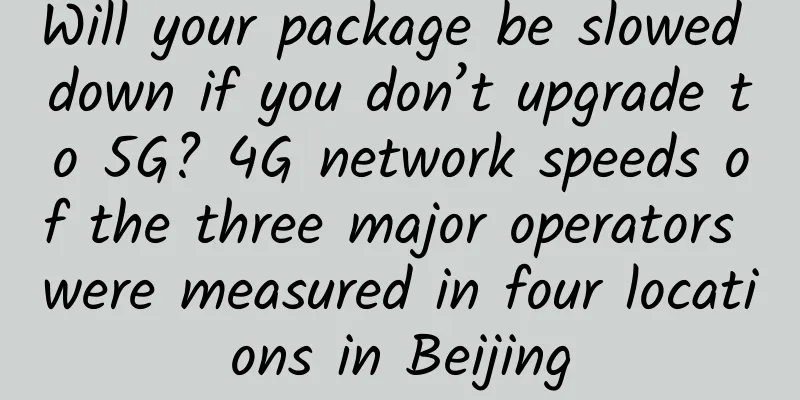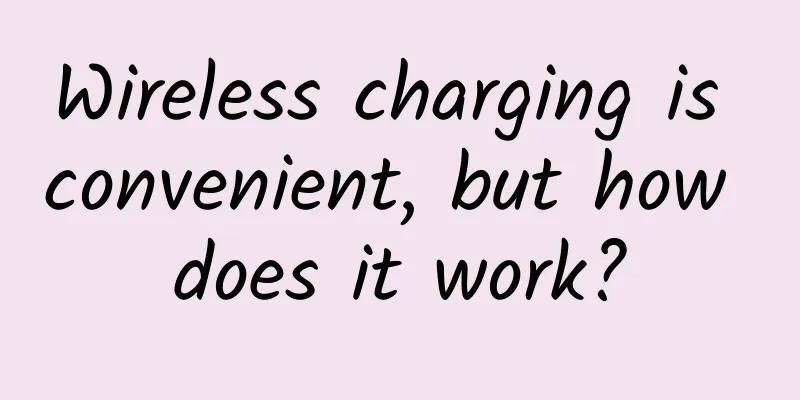Will your package be slowed down if you don’t upgrade to 5G? 4G network speeds of the three major operators were measured in four locations in Beijing

|
"China Unicom launched a 5G package for 239 yuan a month without my knowledge." "I received several calls from customer service threatening me when I signed up for a 5G package: If I didn't upgrade to 5G, the internet speed would be slower and the package would be more expensive in the future." "After I refused to upgrade to the 5G package, the 4G I had used for years suddenly slowed down." Recently, the discussion of "reducing the speed of 4G to promote 5G" has once again become the focus of public opinion. In addition to the network speed problem, consumers also said that they encountered problems such as "being threatened to sign up for a 5G package", "being opened up for a 5G package without knowing it", and "it is difficult to downgrade back to a 4G package after upgrading to a 5G package". In fact, related controversies have emerged since last year, and complaints on social platforms are common. For example, the question "Is it true that 4G speed has been reduced in order to promote 5G?" on Zhihu received 150 answers and 344,000 views. Most of the answers were from users who used their own experiences as examples to complain about the slowdown of 4G network speed. Is the 4G speed really slowing down? Recently, Sohu Technology selected four locations, namely Peking University, National Library, Olympic Forest Park and Zhongguancun Bank Network Center, to test the 4G speed of the three major operators. Sohu Technology compared the speed test data with the data from around 2014 and found that the 4G speed slowed down in some areas and at certain times, but there was no overall decline in the 4G speed. Some people believe that in order to promote 5G packages, operators limit the 4G speed of users who refuse to upgrade to 5G packages. However, many experts told Sohu Technology that this is difficult to do from a technical perspective: "The operator's allocation of user traffic is a batch process. It is impossible to limit the 4G speed of a user who just refused to upgrade to a 5G package. Each operator serves hundreds of millions of users and has very strict user management." 4G network speed test of the three major operators: there are cases of slow network speed in some areas "We have not received any notification from the Ministry of Industry and Information Technology about reducing or limiting users' 4G network speeds, nor have we reduced users' 4G speeds." Previously, the three major operators had also responded that they had not reduced the 4G network speeds. However, users have been constantly reporting related issues on various online platforms, and "Is the 4G network speed really slow?" seems to have become a Rashomon incident. Recently, Sohu Technology selected four locations, including Peking University, National Library, Olympic Forest Park, and Zhongguancun Banking and Network Center, to conduct actual tests on the 4G network speeds of the three major operators. During the testing process at each location, Sohu Technology tested the 4G network of each operator an average of 6 times. After removing the numbers with obvious differences, the median of the remaining numbers was taken, and the total sample size was 144 test results. From the test results, it can be seen that the 4G network speed of the same operator in different locations is quite different. For example, the 4G download speed of China Telecom in the National Library is 79.2 Mbps, while the 4G download speed of China Telecom in Zhongguancun Bank Network Center is only 6.85Mbps. This is far lower than the average download speed of 4G mobile bandwidth in the country. The "China Broadband Speed Status Report" in the third quarter of 2019 shows that the average download speed of my country's mobile broadband users when using 4G networks to access the Internet reached 24.02Mbps. Moreover, even in the same place and at the same time, the 4G network speeds of different operators are very different. For example, in Zhongguancun Bank Network Center, the 4G download speed of China Mobile is 42.49Mbps, the 4G download speed of China Telecom is 6.85Mbps, and the 4G download speed of China Unicom is 5.35Mbps. Regarding the differences in horizontal comparison during the speed test, many experts said that it may be affected by multiple factors such as base station deployment, the number of people tested, the speed test software version and model. "The entire speed test link may be affected by various factors, such as the number of people testing the speed at the same time. If you are the only one testing, the test server will be idle, and the speed test will be faster invisibly." Communications analyst Fu Liang told Sohu Technology. When compared with data from around 2014, it was found that the 4G network speed did not decrease overall, but there were some local areas where the speed slowed down. For example, in the Olympic Forest Park, China Telecom's 4G download speed was 47Mbps in 2014, and 31.8Mbps in 2020. Of course, there are some places where the download speed is faster in 2020. For example, in Zhongguancun Yinwang Center, China Mobile's 4G download speed was 33.05Mbps in 2013, and 42.49Mbps in 2020. Data from the Ministry of Industry and Information Technology in 2019 showed that the average download speed of mobile broadband has increased by about 6 times compared with 5 years ago. Regarding the fact that the overall speed test results are not much different from those 6 years ago, Fu Liang told Sohu Technology that after completing the initial coverage, the subsequent optimization of operators is mainly aimed at some areas with poor coverage, so the network speed improvement will not be very obvious in areas that have completed coverage at the beginning. From the results of this field speed test, the 4G network speed has slowed down in some areas and at certain times, but overall the overall 4G network speed has not decreased. This also confirms the previous response of the Ministry of Industry and Information Technology: "In recent years, the average 4G download speed in the country has continued to increase, and there has been no significant decrease in the speed overall." At the same time, the fact that some users' 4G speed tests at a certain location show a decrease in speed does not mean that the overall 4G speed has decreased. Communications expert Zhang Chi told Sohu Technology: "A single speed test does not represent much. Even if all influencing factors are strictly controlled, it can only mean that there is a problem with a certain base station, not that all 5.4 million base stations have problems." Rapidly growing traffic demand has overwhelmed 4G networks So many complaints and feedbacks also show that the slowdown of 4G network speed in certain areas and at certain times has caused trouble for many users, but this is not because the operators actively slow down the 4G network, but mainly because the growth of 4G user traffic and network support capabilities are not fully matched. The latest data from the Ministry of Industry and Information Technology shows that as of the end of August, the number of 4G users was 1.29 billion, a year-on-year increase of 2.6%, accounting for 80.7% of the total number of mobile phone users. The proportion of 4G users has reached about 80%, and is still growing. At the same time, the average monthly traffic of users is still growing rapidly, especially the average monthly traffic of 4G users. In the first half of 2019, the DOU (average monthly Internet traffic per household) of 4G users of China Mobile, China Unicom and China Telecom were 7.1GB\7GB\7.3GB respectively, while at the end of 2017, the DOU of 4G users of China Mobile, China Unicom and China Telecom were only 1.8GB\4.5GB\2GB. The latest data from the Ministry of Industry and Information Technology shows that the average mobile Internet access traffic per household reached 11.25GB/household in August, a year-on-year increase of 30.3%. From January to August, the cumulative mobile Internet traffic reached 103.9 billion GB, a year-on-year increase of 33.7%. The monthly DOU growth from 2014 to 2019 also shows the trend of skyrocketing user traffic demand. The surge in traffic demand also reflects changes in users' Internet habits to a certain extent. On the one hand, popular Internet applications in the past two years have consumed too much traffic, such as short videos, live broadcasts, ultra-high-definition movies, etc. On the other hand, Zhang Chi told Sohu Technology: "4G network is a limited resource and should be used prudently. Due to the impact of 4G speed increase and fee reduction, everyone is reluctant to use WiFi and will use 4G traffic to download big movies, which will cause a waste of traffic and unreasonable use of bandwidth." However, due to the immaturity of 5G construction and incomplete coverage, for example, there is currently little 5G signal coverage in transportation and office buildings. "Many users of 5G packages use 4G networks when they go to places without 5G signals, and the average traffic of 5G users is more than half that of 4G, which will also put great pressure on the 4G network." Fu Liang told Sohu Technology. As a result, the rapidly growing traffic demand has overwhelmed the 4G network, but the 4G network has not been supported by the corresponding capital investment. Fu Liang said, "For operators, 4G was the main investment last year, but this year's investment in 4G is very conservative, and they are trying to transfer as much money as possible to 5G." According to the plan, the three major operators will significantly increase their 5G capital expenditures, and the investment proportion will increase from about 14% in 2019 to more than 50% in 2020. It should be noted that the total planned capital expenditures of the operators have not increased significantly, so the substantial increase in 5G investment means a reduction in 4G investment. The decrease in the proportion of 4G base stations is one manifestation of this. Data from the Ministry of Industry and Information Technology show that in June 2019, there were 4.45 million 4G base stations in my country, accounting for 60.8%; at the end of 2019, the total number of 4G base stations in my country reached 5.44 million, accounting for 64.7%; at the end of June 2020, the total number of 4G base stations was 5.6 million, accounting for 63.9%. In addition, insiders said that in order to reduce costs and free up funds for 5G construction, operators will cut some 4G base stations, which will cause intermittent 4G signals. Why not continue to maintain large-scale construction of 4G? Fu Liang believes that "operators are also very helpless, because after a few months when 5G networks are ready, users will gradually transfer their traffic to 5G. If they continue to invest in 4G networks on a large scale, it will be a waste after users leave." The promotion of 5G packages is not very profitable, and 4G network speed will become faster in the future At the end of 2019, Li Zhengmao, general manager of China Telecom, publicly stated that 5G development faces three major problems: 5G has a higher frequency and shorter wavelength than 4G, so if 5G is to achieve the signal coverage level of 4G, the number of 5G base stations must be three times that of 4G; because of the higher frequency, the power consumption of 5G base stations will be three times that of 4G base stations; and the construction cost of 5G base stations is also three times that of 4G. As 5G costs remain high, some people believe that in order to promote 5G packages, operators are limiting the 4G speed of users who refuse to upgrade to 5G packages. However, many experts believe that this is almost impossible to do from a technical perspective: "The distribution of user traffic by operators is a batch process, and it is impossible to limit the 4G speed of a user who has just refused to upgrade to a 5G package. Each operator serves hundreds of millions of users and has very strict user management." "Internet fees have little potential to be tapped. In the future, the proportion of Internet users' Internet fees will become smaller and smaller, and the Internet may become a welfare. If operators want to make a profit, they mainly rely on developing industrial Internet, customizing 5G services for enterprises, and earning money from enterprises." Zhang Chi told Sohu Technology that for operators, compared with the huge investment in 5G, package fees only make up a small part. "Most of the people who buy 5G packages now originally bought 4G large-data packages. It's like taking money out of the left pocket and putting it into the right pocket." As for the statement that "if you don't upgrade to 5G, the speed will be slower and the packages will be more expensive in the future", Fu Liang said: "This may be a rhetoric to scare you into using 5G, because if you successfully persuade users to upgrade to 5G packages, the customer service can get the money, but most of the people doing telephone marketing are not employees of the operator." In addition, some users measured a very high 4G network speed, but the actual download speed was very low. This may be because some content providers have set speed limits. "For financial reasons, many software, game and video providers will only purchase a limited number of physical servers or cloud servers. In order to save electricity and other expenses, their download speeds are strictly limited and only single-threaded downloads are supported." At present, network construction is in a transitional stage. 5G network construction is not yet mature, and user traffic demand is still growing rapidly. The traffic demand of 4G and part of 5G is "pressed" on the 4G network. Therefore, the 4G network speed has slowed down in some areas and at certain times, which has intensified the conflict between users and operators. However, with the acceleration of 5G construction, the wider coverage of 5G networks and the further popularization of 5G terminals, when more and more 4G users gradually shift to 5G networks, as the utilization rate of 4G networks decreases, the 4G network speed will naturally increase, and users' network experience will be improved. |
<<: After 5G entered the market, the driving effect began to emerge
>>: The key to managing "big data killing old customers" is to prescribe the right medicine
Recommend
Case Study | Ruishu Information helps a large online payment company upgrade its marketing value
The operation team of a large online payment comp...
V5.NET new cloud server 30% off monthly payment from HK$42, Hong Kong physical server monthly payment from HK$385
V5.NET has announced the news of new cloud server...
2018 Edge Computing Industry Alliance starts a new journey! Huawei promotes technological innovation and accelerates commercial implementation
[51CTO.com original article] Recently, the 2018 E...
TCP/IP based application programming interface
In "TCP/IP Basics: Data Encapsulation",...
[Black Friday] BandwagonHost offers 10% off on all items, starting at $44.9 per year, CN2 GIA line 10Gbps bandwidth optional
Bandwagonhost has released a discount code for th...
CUBECLOUD New Year promotion cloud server 25% off, Los Angeles CN2 GIA/Hong Kong CN2 GIA route optional
CUBECLOUD has launched a limited-time promotion d...
What kind of private network solution does 5G need?
MWC2021 Shanghai has fully demonstrated the achie...
F5 Expands SaaS-Based Security Portfolio with New Distributed Cloud Application Infrastructure Protection
F5 (NASDAQ: FFIV) recently announced the launch o...
Three application strategy investment suggestions to help companies improve user experience
Today, the Asia-Pacific region ranks second in th...
What problems does each generation of HTTP protocol solve?
Recently, I briefly studied the development histo...
Exploration of 5G and edge computing applications in the post-epidemic era
AT&T and many other leading wireless network ...
VMISS 30% off, Hong Kong CN2/Korea CN2/US CN2/Japan IIJ monthly payment starts from 3.5 Canadian dollars
VMISS is still offering a 30% discount this month...
8 Telecom Industry Disruptors of 2018
While some of the larger telecom companies, such ...
"Perceived and controllable applications that change on demand" F5 multi-cloud application service innovation online conference transcript
At 10:00 am on December 16, F5, the world's l...
Blockchain development faces four major "pain points"
Not long ago, the central bank and seven other mi...



![[Black Friday] FlipperHost: 2GB memory KVM monthly payment starts at $4.9, 4 data centers in Los Angeles and other places](/upload/images/67cac473c3319.webp)





